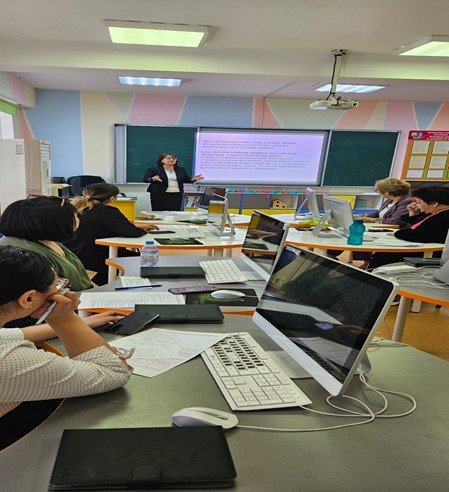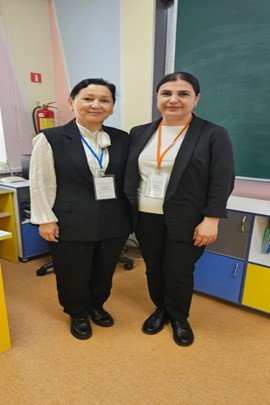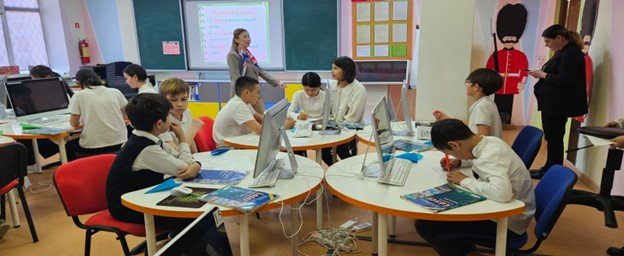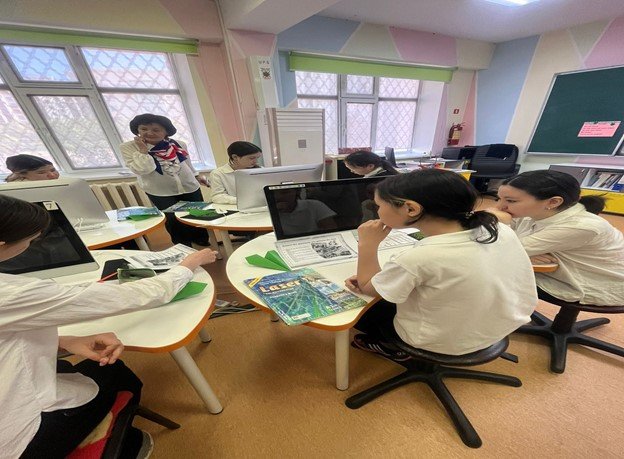On May 20-21 and May 22-23, language and methodological experts from IITU visited schools in Astana and Shymkent involved in a project to improve children's literacy. The primary goals of the experts' visit to schools in the capital and the southern region were: meeting new teachers of Russian and English, conducting a survey among teachers on the Akelius project (electronically), conducting a focus group discussion with 6th-grade students, assessing students' knowledge on the project, providing offline methodological and technical advice, discussing classroom management and digital environment organization, presenting teaching materials for effective project implementation, and more.
It is important to note that the experts planned and carried out visits to the following schools in Astana: School-Lyceum No. 53, School No. 60, School-Lyceum No. 62, and School No. 75. Observing lessons and engaging in live communication allowed the experts to outline a plan for organizing future teacher training sessions and creating methodological guidelines for student assessment.

Russian language teachers Kurakbayeva Zh.A. and Kyazimova Z.S. conducted a methodological analysis of the use of the Akelius application in Russian language lessons, systematized the pros and cons of the blended format, and drew conclusions.

Language expert Oksana Bublikova noted that the second phase of the Akelius project is progressing well, as evidenced by the experience of teachers involved in the first phase. According to her, teachers seem to understand when to use Akelius. Oksana Bublikova also noted that each teacher's lessons are unique and engaging, with every teacher striving to use different tools to involve students in the learning process and achieve common learning goals.
The experts also attended the English demo-lesson at School No. 75, which was conducted in a blended format using the “Rotation of Stations” model. According to Oksana Bublikova, teachers Zhanar Bikenova and Bagila Kaliyeva demonstrated the successful application of the “Rotation of Stations” model during the lesson.

However, Oksana Bublikova also observed several methodological challenges during the classes: often, teachers involved only individual, usually strong, students, which is a common feature of open lessons.

Senior lecturer Ainur Nurakhynova also commented on the technical equipment of the capital's schools, particularly School-Gymnasium No. 75, and the professional preparedness of its teachers. She noted that Astana has a high level of schools and teachers who actively participate in the project and are committed to fulfilling their duties and achieving results.
Language experts Zhannura Manapbayeva, project coordinator, and Aizhan Kalmykbayeva, senior lecturer of the Department of Languages, visited several schools in Shymkent involved in the project: Secondary School No. 56 named after S. Kubeyev, Secondary School No. 76 named after R. Myrzashev, IT School-Lyceum No. 80, Secondary School No. 86, and Secondary School No. 122. The situation in Shymkent schools is similar to that in the capital.
Zhannura Manapbayeva observed some technical difficulties were encountered during the visit. Tablets were actively and efficiently used, but there was dependence on the Internet, as all necessary materials were not pre-downloaded to the tablets. However, she noted that some classes lacked active forms of work, with children divided into groups using the “Rotation of Stations” model but performing identical tasks.
During their visits to the aforementioned schools, experts not only attended classes but also held a focus group discussion with 6th-grade students and conducted offline methodological and technical consultations. They presented methodological materials for effective project implementation and noted that work on improving the course on the Akelius platform would continue. At the end of the visit, they awarded certificates for the completed training sessions.
